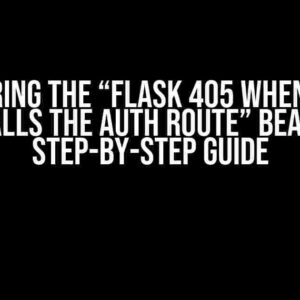Are you a VueJS3 developer who’s been experiencing a frustrating issue with image requests being blocked on localhost for exactly 2 seconds when switching routes in Firefox? Well, you’re not alone! In this article, we’ll delve into the root cause of this problem, explore the reasons behind it, and provide a step-by-step guide to resolving this issue once and for all.
Understanding the Problem
Before we dive into the solution, let’s take a closer look at the problem itself. When you’re developing a VueJS3 application and testing it locally on Firefox, you might notice that image requests are blocked for exactly 2 seconds when switching routes. This can be frustrating, especially when you’re working on an application that relies heavily on images.
So, what’s causing this issue? The culprit behind this problem is Firefox’s cross-origin resource sharing (CORS) policy. By default, Firefox has a policy of blocking certain types of requests to localhost, including image requests, for exactly 2 seconds when switching routes. This is done to prevent malicious scripts from making unauthorized requests on behalf of the user.
Why Does This Happen Only on Firefox?
You might be wondering why this issue only affects Firefox and not other browsers like Chrome or Edge. The reason lies in the way Firefox handles CORS policies. Unlike other browsers, Firefox has a more aggressive CORS policy that’s designed to provide an additional layer of security for its users.
In particular, Firefox implements a feature called “Temporary CORS relaxation” which allows it to block certain types of requests to localhost for a short period of time (in this case, 2 seconds) when switching routes. This feature is designed to prevent malicious scripts from making unauthorized requests on behalf of the user, but it can also cause issues for legitimate requests like image loading.
Solving the Problem
Now that we understand the root cause of the problem, let’s explore the solutions. Fortunately, there are a few ways to resolve this issue, and we’ll cover them in detail below.
Method 1: Disable CORS Policy in Firefox
One way to resolve this issue is to disable CORS policy in Firefox. You can do this by setting the `security.cors.disable` preference to `true` in the Firefox configuration file.
about:config
In the search bar, type `security.cors.disable` and set the value to `true`. This will disable CORS policy in Firefox, allowing image requests to load normally.
However, keep in mind that disabling CORS policy can compromise the security of your browser, so use this method at your own risk.
Method 2: Use the `crossorigin` Attribute
Another way to resolve this issue is to add the `crossorigin` attribute to your image tags. This tells the browser to make a CORS request, which allows Firefox to relax its CORS policy and load the image normally.
Here’s an example:
<img src="/path/to/image" crossorigin="anonymous">
By adding the `crossorigin` attribute, you’re telling the browser to make a CORS request, which allows Firefox to load the image normally.
Method 3: Use a Proxy Server
A third way to resolve this issue is to use a proxy server. A proxy server acts as an intermediary between your application and the external resources it requests, allowing you to bypass CORS policy restrictions.
Here’s an example of how you can set up a proxy server using VueJS3’s built-in proxy feature:
module.exports = {
devServer: {
proxy: {
'/api': {
target: 'http://localhost:8080',
changeOrigin: true,
pathRewrite: { '^/api': '' }
}
}
}
}
In this example, we’re setting up a proxy server that forwards requests from `/api` to `http://localhost:8080`. This allows us to bypass CORS policy restrictions and load external resources normally.
Method 4: Use a CORS Proxy
A fourth way to resolve this issue is to use a CORS proxy. A CORS proxy is a service that acts as an intermediary between your application and the external resources it requests, allowing you to bypass CORS policy restrictions.
Here’s an example of how you can use a CORS proxy:
<img src="https://cors-proxy.example.com/http://localhost:8080/path/to/image">
In this example, we’re using a CORS proxy to forward requests from `http://localhost:8080/path/to/image` to the proxy server, which then forwards the request to the external resource. This allows us to bypass CORS policy restrictions and load the image normally.
Conclusion
In this article, we’ve explored the mysterious case of VueJS3 on Firefox blocking image requests on localhost for exactly 2 seconds on route change. We’ve delved into the root cause of the problem, explored the reasons behind it, and provided a step-by-step guide to resolving this issue using four different methods.
By following the instructions outlined in this article, you should be able to resolve the issue of image requests being blocked on localhost for exactly 2 seconds on route change in Firefox. Remember to choose the method that best fits your needs and use it responsibly.
FAQs
Here are some frequently asked questions related to this topic:
-
Why does this issue only affect Firefox?
This issue only affects Firefox because of its aggressive CORS policy, which is designed to provide an additional layer of security for its users.
-
Is disabling CORS policy in Firefox safe?
Disabling CORS policy in Firefox can compromise the security of your browser, so use this method at your own risk.
-
Can I use the `crossorigin` attribute for all image requests?
Yes, you can use the `crossorigin` attribute for all image requests, but keep in mind that this can affect performance and may not be necessary for all requests.
| Method | Description |
|---|---|
| Disable CORS policy in Firefox | Disables CORS policy in Firefox, allowing image requests to load normally. |
| Uses the `crossorigin` attribute to make CORS requests, allowing Firefox to relax its CORS policy. | |
| Use a proxy server | Uses a proxy server to bypass CORS policy restrictions and load external resources normally. |
| Use a CORS proxy | Uses a CORS proxy to forward requests to external resources, bypassing CORS policy restrictions. |
We hope this article has been helpful in resolving the issue of VueJS3 on Firefox blocking image requests on localhost for exactly 2 seconds on route change. If you have any further questions or need additional assistance, feel free to ask!
Here are 5 FAQs about “VueJS3 on firefox blocks image requests on localhost for exactly 2 seconds on route change”:
Frequently Asked Questions
Get the scoop on VueJS3’s quirky behavior on Firefox – we’ve got the answers you need!
What’s the deal with VueJS3 on Firefox blocking image requests on localhost?
It’s a known issue! When you navigate between routes in a VueJS3 app on Firefox, the browser blocks image requests to localhost for exactly 2 seconds. This is due to a security feature called “Speculative LOADS” in Firefox, which aims to prevent speculative attacks.
Why does this happen only on Firefox and not on other browsers?
The culprit is Firefox’s unique implementation of the “Speculative LOADS” feature. Other browsers, like Chrome and Edge, don’t have this feature, so they don’t exhibit the same behavior. VueJS3 itself is not the issue; it’s just how Firefox decides to handle route changes.
What can I do to work around this issue in my VueJS3 app?
There are a few workarounds! You can try setting the `crossorigin` attribute on your images, use a proxy server, or even implement lazy loading for your images. Another option is to disable the “Speculative LOADS” feature in Firefox, but that’s not recommended for security reasons.
Is this a VueJS3 bug or a Firefox bug?
It’s not really a bug in either VueJS3 or Firefox! The issue arises from the interaction between VueJS3’s route changes and Firefox’s security feature. Both parties are doing their jobs correctly; it’s just an unfortunate side effect. Nonetheless, the VueJS3 team is exploring ways to mitigate this issue in future updates.
Will this issue be fixed in future versions of VueJS3 or Firefox?
The VueJS3 team is actively working on finding a solution. In the meantime, Firefox might also reconsider or refine their “Speculative LOADS” feature to minimize the impact on web applications. Keep an eye on the VueJS3 and Firefox release notes for updates!




